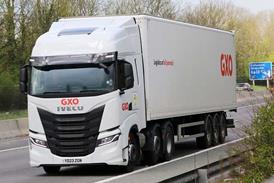![Geopost - Visual Carbon Calculator - 05.06.2023[54616]](https://d2cohhpa0jt4tw.cloudfront.net/Pictures/480xany/9/8/7/7987_Geopost-Visual-Carbon-Calculator-05.06.202354616.png)
DPD parent company Geopost has launched its Carbon Calculator to help shippers better understand, report and reduce their parcel delivery carbon emissions.
The company has launched the tool after successfully test-driving it inhouse, as well as with a number of key customers.
The technology aims to support shippers’ carbon reduction strategies by enabling them to analyze, in real time, report and reduce emissions over the long term.
The tool uses scan events to track each parcel as it moves through the Geopost network, allowing the company to provide its customers with emissions data which is specific to their shipments, as well as real-time visibility on their Scope Three emissions.
The calculator, which is accredited by the Smart Freight Centre, is already available in ten business units across Europe, including DPD UK.
Gepost also plans to make it available to all Geopost’s customers by the end of 2023, across Geopost's 20 largest European business units.
Read more
- DPD UK welcomes approval for Geopost net-zero target
- GeoPost and DPDgroup ramp up net zero targets
- GeoPost launches new international identity
Commenting on the launch, Jean-Claude Sonet, Geopost executive vice president for marketing, communications and sustainability, said: "At Geopost, we have proven since 2012 our expertise in innovating for sustainable outcomes by constantly improving how we quantify and report on carbon emissions to the benefit of our customers.
"I firmly believe that our Carbon Calculator is a perfect example of this. It is a pioneering tool, built in line with international carbon accounting standards, designed to help businesses meet the need for accurate, regular CO2 emissions reporting – all while helping them make more sustainable decision making in the long-term.”
The calculator is being rolled out as customer expectations on the sustainability of parcel deliveries continue to rise.
A recent Geopost’s study into European e-shoppers' habits revealed that almost two thirds (64%) of regular online shoppers are willing to go to a different website to find a more sustainable
delivery option.
However, the same study also revealed that e-shoppers largely feel that sustainability is the responsibility of brands and companies.











![Mercedes-Benz_eActros_600_(1)[1]](https://d2cohhpa0jt4tw.cloudfront.net/Pictures/274x183/8/2/0/17820_mercedesbenz_eactros_600_11_978080.jpg)



